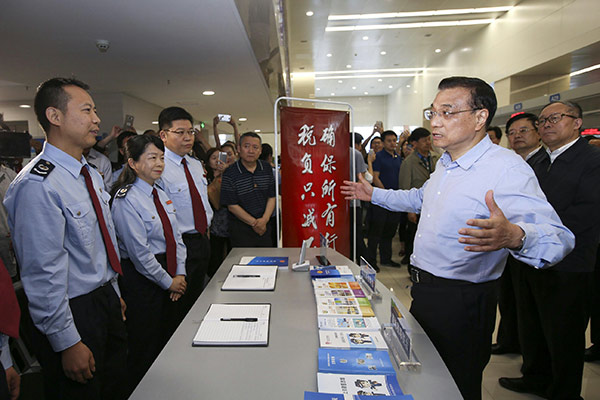
Premier Li Keqiang visits the civic service center of Shiyan government in Central China’s Hubei province and inquires about the implementation of VAT reform on May 23, 2016.
China’s ongoing nationwide value-added tax reform has reduced tax burdens for enterprises, and savings are projected to total 500 billion yuan ($73 billion) by the end of this year.
This was announced at the State Council’s executive meeting on Nov 29, presided over by Premier Li Keqiang, as he heard a report on the current progress of VAT reform and further elaborated on tasks ahead.
VAT reform, which set out to reduce tax burdens on service industries and boost industrial upgrading and innovation, extended China’s value-added tax to a whole variety of industries since May, including construction, real estate, finance and consumer services. The reform is a nationwide structural tax reduction across all industries.
The reform is carried out through joint efforts by various departments, with detailed policy adjustments as needed in order to facilitate its smooth implementation.
VAT reform plays a crucial role in China’s effort to ensure steady economic growth and structural adjustment, Premier Li stressed.
Figures from the Ministry of Finance show that the reform is paying off. From May to October, taxes continued to drop for all subsectors within the construction, real estate, and financial sectors and consumer services industry, and the reform saw an increase of 530,000 new taxpayers within the four sectors. Over the past six months, the new tax scheme has helped enterprises in the four sectors save a total of 96.5 billion yuan that otherwise would have been paid as tax.
A total of 98.5 percent of business owners in the four sectors saw their tax burden reduced or at least leveled off.
“Our goal through VAT reform is to better invigorate the market and boost the modern service industry,” Premier Li said. “The steady progress of tax cuts reduces the burden for enterprises, and will help create enormous employment opportunities.”
The Premier has placed great focus on the progress of the reform, asking all related departments to develop tailored policies for various sectors in order to fully boost mass innovation and industrial upgrading.
There are still problems to be addressed. For example, sectors such as finance, technology and tourism may require more tailored tax assessment measures. There are also companies yet to fully make use of the new VAT scheme.
A set of measures will be implemented soon to improve the reform. Tax assessment measures will be further tailored in the construction and financial sectors. Guidance will be provided to business owners on how to understand and make the best use of the new taxation policy and truly benefit from the reform. The government will also improve ways to collect taxes and provide more convenience to taxpayers.
A third-party evaluation will be carried out on the reform.
“Reducing taxes will not only benefit enterprises, but will also bring greater good to the country in the long run,” Premier Li said. “This is part of our positive fiscal policy, instead of giving policy support to particular industries and returning to a planned economy.”
The meeting on Nov 29 also decided that VAT revenue will be redistributed to local governments proportionately. This is aimed at encouraging both central and local departments to participate in the tax reform, as well as lending support to underdeveloped regions’ fiscal capacity.
